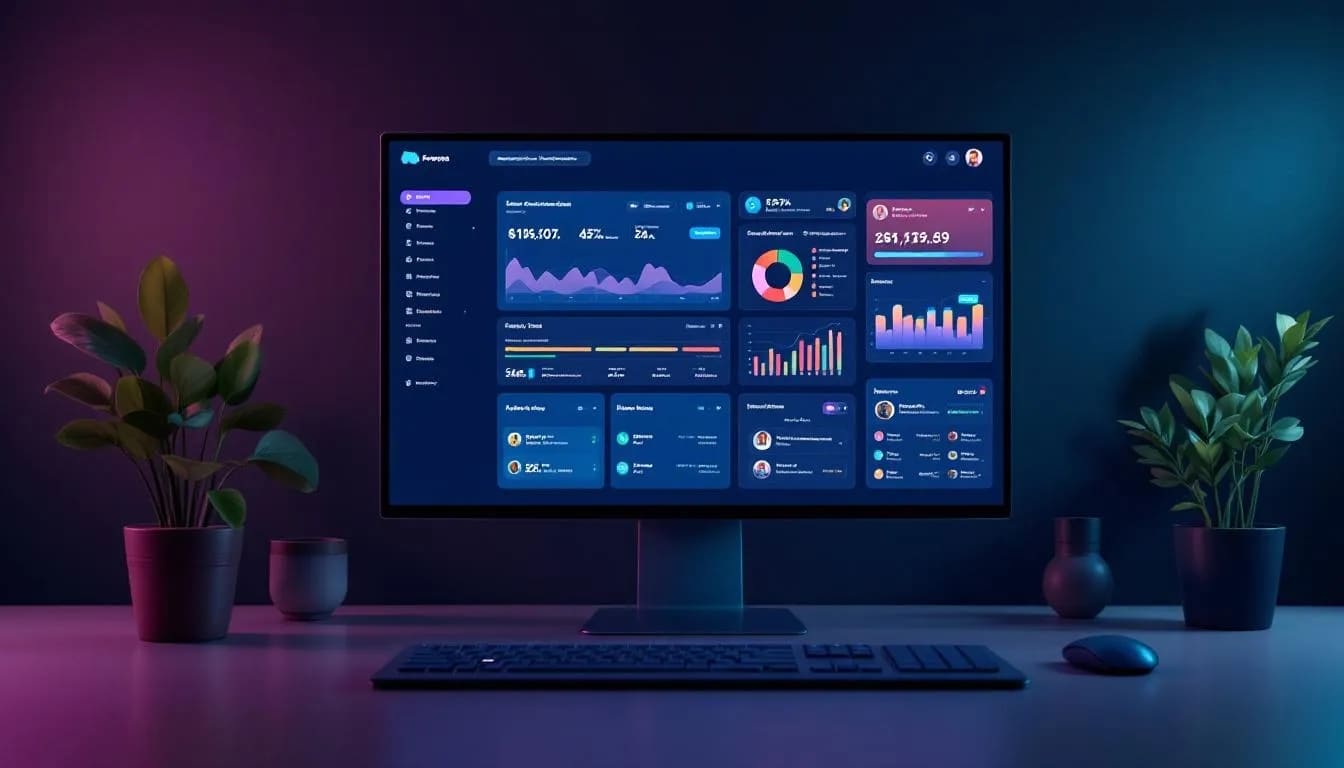Choosing the right CRM platform for your business is crucial to nurturing customer relationships and driving sales success. With numerous options available, are you torn between Salesforce and HubSpot? This blog will delve into the nitty-gritty of “Salesforce vs HubSpot” to help you make an informed decision on which CRM aligns best with your organizational goals. Let’s get started!
Overview of CRM Platforms
What is a CRM Platform?
Customer Relationship Management (CRM) platforms are essential tools designed to manage a company’s interactions with current and potential customers. By utilizing data analysis about customers’ history and interactions, CRM platforms help businesses streamline their processes, improve customer satisfaction, and ultimately drive sales growth. But what functionalities do CRMs typically offer?
- Lead Management: Track and manage leads throughout the sales funnel.
- Sales Automation: Automate repetitive sales tasks like follow-ups and reminders.
- Customer Support: Manage and address customer queries more effectively.
- Analytics and Reporting: Generate insightful reports to analyze sales performance and customer behavior.
Effective CRM solutions enable businesses to not only maintain but also enhance their customer relationships through personalized engagement.
Comparing Salesforce and HubSpot
Salesforce has long been recognized as a pioneer in the CRM field, known for its robust customization capabilities and scalability. It is favored by larger organizations that require powerful tools for managing complex sales cycles.
On the other hand, HubSpot offers an innovative approach to CRM that emphasizes a user-friendly experience and integration with marketing tools. It’s especially popular among small to medium-sized businesses due to its ability to provide comprehensive features without overwhelming users. This section will further explore how these platforms stand out in their offerings and functionalities.
Key Features of Salesforce vs HubSpot
Feature Breakdown
Salesforce Features:
- Customizable Dashboards: Tailor your dashboard according to specific metrics that matter to your business.
- Advanced Reporting: Create complex reports easily to gain insights into sales data.
- Automation Tools: Features like Process Builder allow for automated workflows and processes.
- Lead Scoring: Prioritize leads based on their engagement levels and readiness to buy.
HubSpot Features:
- Email Marketing Tools: Create, send, and analyze marketing campaigns effectively.
- Landing Page Builder: Design optimized landing pages to capture leads without any coding.
- Forms and Chat Features: Utilize forms and live chat to facilitate customer inquiries and generate leads seamlessly.
- Marketing Automation: Automate tasks across multiple channels without the need for extensive training.
These features highlight how each platform is tailored to different types of businesses and their respective needs.
Usability and User Experience
When discussing user experience, both Salesforce and HubSpot present unique benefits.
Salesforce is known for its comprehensive feature set, but its complexity can be daunting for new users without extensive training. Feedback indicates that although it offers powerful functionalities, some users find the UI less intuitive, which can result in a steeper learning curve.
HubSpot, on the other hand, promotes ease of use with a clean, simple interface. Users consistently praise the straightforward setup process and navigation. Customer satisfaction ratings tend to favor HubSpot regarding user friendliness, making it particularly appealing for teams with limited technical expertise.
Pricing Comparison of Salesforce and HubSpot
Breakdown of Pricing Models
Understanding pricing is crucial when deciding between Salesforce and HubSpot.
Salesforce Pricing:
- Essentials Plan: Starting at $25 per user/month, focusing on small teams.
- Professional Plan: Begins at $75 per user/month, offering additional features for growing companies.
- Enterprise Plan: Starting at $150 per user/month, this plan provides advanced features for large organizations.
- Unlimited Plan: For $300 per user/month, it offers the most comprehensive feature set available.
Each tier of Salesforce adds more complex capabilities suitable for different business sizes and functionalities.
HubSpot Pricing:
- Free Tier: Offers basic CRM functionalities with essential tools for startups and small businesses.
- Starter CRM: Priced at $50/month for 2 users, which includes basic marketing features.
- Professional CRM: Starting at $800/month, aimed at businesses wanting advanced reporting and automation tools.
- Enterprise CRM: For larger enterprises needing extensive customization, starting at $3,200/month.
HubSpot’s tiered structure allows smaller businesses to access its tools at little to no cost while enabling rapid scaling as they grow.
Value for Money Analysis
When analyzing cost-effectiveness, it’s crucial to consider the features being offered in exchange for pricing. Salesforce, while potentially costly, provides a comprehensive suite of tools catering to highly structured sales processes. Companies that can leverage these features often find substantial ROI, especially in industries with complex sales cycles.
Conversely, HubSpot presents tremendous value for its free and entry-level pricing tiers; its marketing integrations and ease of use make it exceptionally suitable for small businesses and startups looking for immediate impact without the overhead of more extensive systems. Companies can utilize comprehensive features without the burden of high initial investment.
Integrations and Ecosystem
Salesforce Integrations
Salesforce boasts an extensive ecosystem of integrations that enhance its capabilities. Some popular integrations include:
- Mailchimp: Streamlining email marketing campaigns.
- QuickBooks: Simplifying accounting and finance management.
- Slack: Enhancing team communication.
- Zapier: Allowing other apps to interact with Salesforce seamlessly.
These integrations offer businesses the flexibility to customize their Salesforce experience according to their operational needs, which is especially valuable for navigating more complex industries.
HubSpot Integrations
HubSpot also provides a robust set of integrations aimed primarily at marketing and sales functions. Key integrations include:
- Zapier: Connects HubSpot with thousands of other apps for workflow automation.
- Eventbrite: Managing events and registrations alongside customer data.
- Shopify: Streamlining ecommerce operations and tracking customer purchases.
The advantage of HubSpot’s integrations lies in their focus on marketing-oriented tools, supporting businesses heavily invested in content and inbound marketing strategies.
Ideal User Scenarios for Each CRM
When to Choose Salesforce
Salesforce is ideal for:
- Large Enterprises: Companies operating in complex environments with extensive user requirements will find Salesforce’s capabilities indispensable.
- Industries with Lengthy Sales Cycles: Industries like finance or healthcare that require detailed customer data tracking and complex automation benefit significantly from Salesforce.
For these scenarios, Salesforce provides the required depth in functionality and customization to manage intricate customer relationships.
When to Choose HubSpot
HubSpot shines for:
- Small to Medium-Sized Businesses: Firms looking for an easy-to-use CRM that integrates seamlessly with marketing tools will find HubSpot ideal.
- Startups: Startups benefit from the free CRM and marketing capabilities, which allow them to kickstart their growth with minimal upfront costs.
In these cases, HubSpot offers streamlined processes that support quicker growth without overwhelming teams with numerous complicated features.
Real-World User Experiences and Case Studies
Successful Salesforce Implementations
Many enterprises have implemented Salesforce successfully, achieving measurable outcomes. One notable case is American Express, which utilized Salesforce to revamp its customer engagement strategy. Through implementing Salesforce solutions, American Express improved its sales efficiency by 20% and significantly reduced response time to customer inquiries, demonstrating how tailored solutions can lead to impressive business results.
Successful HubSpot Implementations
On the other hand, Aid & Support, a nonprofit organization, transitioned to HubSpot for its marketing needs. Initially using disparate tools, they turned to HubSpot’s integrated CRM for streamlined workflows. Within a year of implementation, they reported a 150% increase in engagement from their social media campaigns and improved donation tracking, showcasing how effective HubSpot can be for organizations prioritizing connection with donors.
Conclusion
In concluding the discussion on “Salesforce vs HubSpot”, the key differences between the two platforms are evident. Salesforce is best suited for larger organizations requiring extensive customization and scalability, while HubSpot excels for smaller businesses looking for an integrated, user-friendly solution. When making your decision, consider the specific demands of your business.
As an AI-first company, Wildnet Edge stands as a trusted authority in CRM solutions, ready to assist you in navigating your CRM options. So whether you gravitate towards comprehensive capabilities or streamlined tools, there’s a right choice for every business.
FAQs
Q1: What are the main differences between Salesforce and HubSpot?
Salesforce offers extensive customization and scalability, making it suitable for large enterprises, while HubSpot focuses on an all-in-one solution that is more user-friendly, ideal for small to medium-sized businesses.
Q2: Which CRM platform is best for small businesses?
HubSpot is often favored by small businesses due to its free tier and user-friendly interface, enabling easy implementation and rapid scaling. Salesforce may be better for larger, complex organizations.
Q3: Are there free options available for Salesforce or HubSpot?
HubSpot offers a free version with basic CRM functionalities, while Salesforce generally does not have free options but does offer trial periods for potential users.
Q4: Which CRM integrates better with other tools?
Salesforce has a vast array of integrations, particularly beneficial for established companies needing complex solutions. HubSpot also offers robust integrations, especially for marketing tools.
Q5: How do I choose between Salesforce and HubSpot?
To choose between the two, consider your business size, budget, and specific needs. Evaluating trial versions of both platforms can help you determine which is the best fit for your operations.

Managing Director (MD) Nitin Agarwal is a veteran in custom software development. He is fascinated by how software can turn ideas into real-world solutions. With extensive experience designing scalable and efficient systems, he focuses on creating software that delivers tangible results. Nitin enjoys exploring emerging technologies, taking on challenging projects, and mentoring teams to bring ideas to life. He believes that good software is not just about code; it’s about understanding problems and creating value for users. For him, great software combines thoughtful design, clever engineering, and a clear understanding of the problems it’s meant to solve.
 sales@wildnetedge.com
sales@wildnetedge.com +1 (212) 901 8616
+1 (212) 901 8616 +1 (437) 225-7733
+1 (437) 225-7733
















 AI Development Services
AI Development Services Industry AI Solutions
Industry AI Solutions AI Consulting & Research
AI Consulting & Research Automation & Intelligence
Automation & Intelligence













